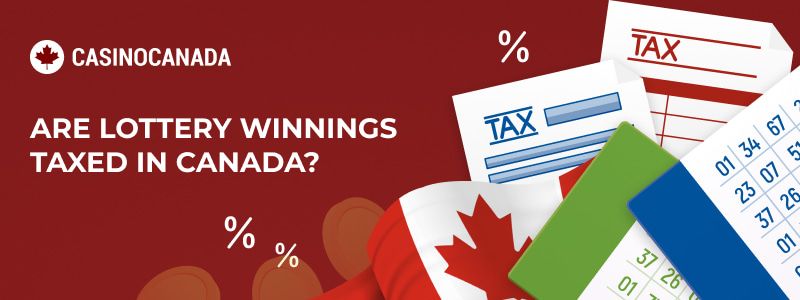Are Lottery Winnings in Canada Taxable?

In 2024, Canada is celebrating the 50th anniversary of its first national lottery. The so-called Olympic lottery took place in 1974, and it helped raise more than $230 million for the Montreal Olympics. It featured a $1 million tax-free jackpot prize that was the biggest lottery jackpot ever at the time.
Today, Canada continues to provide lottery options to its residents. Lottery winners in Canada typically do not have to pay taxes on their winnings, similar to the tax treatment for money earned from casino games and sports betting. Continue reading to understand the specific conditions under which lottery winnings in Canada may be taxable.
What to expect if you win the lottery
Back in 1974, there was only one national lottery offered in Canada. But in 2026, there are three national lotteries, including the Lotto 6/49, Lotto Max, and Daily Grand lotteries.
If you’re lucky enough to win one of these lotteries - the odds of hitting a jackpot while playing the lottery through the OLG is 1 in 33,294,800 - it’s important to know what to do next. Begin by signing your ticket to claim ownership of it and plan to turn it in to collect your lottery winnings before its expiration date.
Lottery winnings are typically received within five business days. How you choose to use the money—spending, saving, or investing—can affect its tax status in Canada.
How much tax do you pay on lottery winnings in Canada?
When you hit the US lottery, you might wonder where all your lottery winnings have gone before long, as they will be subject to heavy taxes. You’ll often have 25% of your lottery prize taken by the Internal Revenue Service to pay federal taxes and have to withhold an additional 12% to cover state taxes.
This isn’t the way things work in Canada, as you won't have to set aside money for taxes on lottery winnings as long as you only play the lottery recreationally. There are only a couple of instances in which lottery winners in Canada will end up with money that's taxable. Let’s look at several cases when lottery money is taxed.
Professional gambler winnings tax
About two-thirds of Canadian adults admit to gambling over the last year. The vast majority are recreational gamblers who won’t need to worry about paying taxes on lottery winnings or other online wagering victories.
However, there are also some professional gamblers incorporated into the mix, and these people will need to pay taxes on any lottery prize money or other windfalls. A professional gambler is defined as someone who relies on gambling-related taxable income to make a living. Pro bettors in Canada are often subject to tax rates that range from 15 to 33%.
If you fall into this category, look into trying to deduct expenses to reduce taxes owed to the Canada Revenue Agency (CRA). It's essential to speak with a wealth manager about tax deductions.
Income tax from money made with lottery winnings
After hitting the lottery in Canada, you’ll be tempted to toss your newfound money into a savings account for safekeeping. While this isn’t a bad idea, you might have to cover the cost of taxes if you have an interest-bearing savings account.
You might also face taxes if you begin investing your lottery prize money in stocks or mutual funds and make profits off your lottery payout through capital gains earned. You might even pay a hefty tax on lottery money if you start a business with them and generate business income and claim business expenses with it.
The tax implications you’ll face when it comes to paying taxes on the interest earned from lottery winnings or the capital gains made by investing lottery money will depend on which province you live in.
Tax laws by province
If you're taxed on lottery winnings or money you secure while betting on sports or playing games at good online casinos in Canada, the amount of taxes you pay will change based on your province. Check out this useful chart to see how much money pro gamblers and those who invest their lottery prize money to earn a dividend from companies can expect to pay in taxes.
| Province | Tax |
|---|---|
| Alberta | For the first C$142,292 tax is 10%. In Calgary and other areas of Alberta, the maximum tax is 15% on income exceeding C$341,502 |
| British Columbia | From C$45,654 the tax starts at 5.06% and spans up to 20.5% for winnings over C$240,716. |
| Manitoba | For earnings up to C$36,842 tax is 10.8%, for earnings more than C$79,625 tax is 17.4%. |
| New Brunswick | For the first C$47,715 tax is 9.4%. For amounts over C$176,756, it's 19.5%. |
| Newfoundland and Labrador | Tax is 8.7% for the initial C$41,457, for a sum over C$1,059,000, it's 21.8%. |
| Nova Scotia | Up to C$29,590, the tax is 8.79%. Earnings over C$150,000 are taxed at 21%. |
| Ontario | The taxes span from 5.05% to 13.16% depending on the earning bracket. |
| Prince Edward Island | For the initial C$31,984 the tax is 9.8% and 16.7% for amounts over $63,969. |
| Saskatchewan | Tax is 10.50% up to C$49,720 and 14.5% for amounts exceeding $142,058. |
| Quebec | The tax is 14% for income up to C$49,275, |
Lottery winners in Canada
There have been many notable lottery wins in Canada since 1974. Now that we’ve gone over when to consider lottery winnings taxable in Canada, let’s work through the five most impressive wins in Canada’s lottery history.
-
The $70 million Lotto Max lottery:
Adlin Lewis, a credit risk manager, won the largest jackpot in the history of the Canadian lottery in early 2020. He walked away with $70 million.
-
The $68 million Lotto 6/49 lottery:
Noel Patricio, a housekeeper, won the biggest 6/49 lottery prize ever in December 2023. He earned $68 million but claimed he didn’t plan to quit his job.
-
The $64 million Lotto 6/49 lottery:
Merel Chiasson, a fisherman, allowed a jackpot-winning 6/49 ticket to sit on his dresser for a year before claiming his lottery winnings in March 2024. He turned the ticket in to win a whopping $64 million.
-
The $60 million Lotto Max lottery:
Bon Truong, a landscaper, played the same numbers every day for 30 years and eventually won the grand prize. He pocketed $60 million after spending ten months thinking about what he would do with his winnings.
-
The $48 million Lotto 6/49 lottery:
Juliette Lamour, a university student, won one of the largest 6/49 lotteries ever while playing the lottery for the first time. She was just 18 when she scored $48 million.
Tax free lottery wins
Winning the lottery doesn’t always feel like a win in other countries, but it does in Canada since people who win the lottery get to keep every last penny of a jackpot. You will only face taxes on lottery winnings if you are a professional gambler or if you use the winnings to generate additional income through investments.
If you’d like to save lottery winnings without worrying about paying taxes, how about opening a tax-free savings account (TFSA)? Opening a TFSA through a bank or financial institution can help you save lottery winnings without incurring taxes on the interest earned. Find out if you qualify to open a TFSA.
Consider opening a Registered Retirement Savings Plan (RRSP) or a Non-registered Savings Plan (NRSP) to secure your financial future. Many individuals take advantage of these options to optimize their financial planning.
Summary
In Canada, lottery winnings are typically tax-free, offering a significant advantage to winners. Unlike in the U.S., where heavy taxes are imposed, Canadians who win lotteries can keep the full amount as long as they are not professional gamblers. However, if lottery winnings are invested or generate additional income, such as through interest or capital gains, taxes may apply depending on the province. For those looking to join in the excitement, there are many opportunities to participate in online lotteries at safe gaming platforms, carefully selected through our trusted online casino reviews to ensure a secure and enjoyable experience.
Gambling taxes FAQ
Is gambling taxed in Canada?
No, gambling isn’t taxed in Canada. The only exceptions to this will be if you’re considered a professional gambler or if you use gambling winnings to earn income on interest or investments. In these cases, you may be taxed on gambling winnings in Canada after you're paid interest or sell the investments.
Why are lottery winnings not taxed in Canada?
Lottery winnings aren’t taxable in Canada because the country views them as "windfalls" as opposed to income generated. They look at a lottery win just like an inheritance or gift money, and just like gifts and inheritances and other unexpected payments, it isn't subject to taxation.
Do you get the full amount when you win the lottery in Canada?
Yes, you will get the full amount of money that you’ve won while playing the lottery when you hit the jackpot in Canada. You’ll only have to devote a portion of your lottery winnings to tax obligations if you’re a pro gambler or if you’ve used lottery winnings to earn interest or profits from investments.
Do you have to declare lottery winnings in Canada?
No, Canadians don’t have to declare lottery winnings in Canada when doing taxes unless you work as a pro gambler or have earned interest by keeping lottery winnings in an interest-bearing savings account. You might also need to declare them if you use lottery winnings to buy stocks.
Do Canadian lottery winners have to go public?
Yes, those who win the lottery in Canada usually have to go public when they turn in winning tickets. The rush of excitement surrounding their win is great publicity for Lotto Max or 649 drawings. People can only remain anonymous in rare instances in which revealing their identities would put them in harm's way.
Can a tourist win the lottery in Canada?
Yes, a tourist can win the lottery in Canada and they won't have lottery winnings taxed in Canada. But unlike when a Canadian wins the lottery, tourists need to check on the tax laws in their respective countries to ensure they pay the proper taxes on lottery winnings.
How long do you have to claim lottery winnings in Canada?
You have about a year to claim your prize when you win the lottery in Canada in most cases. Check the expiration dates on lottery tickets to make sure you claim winnings before they expire on you. It is rare for someone to hold onto a winning lottery ticket for more than a year.















